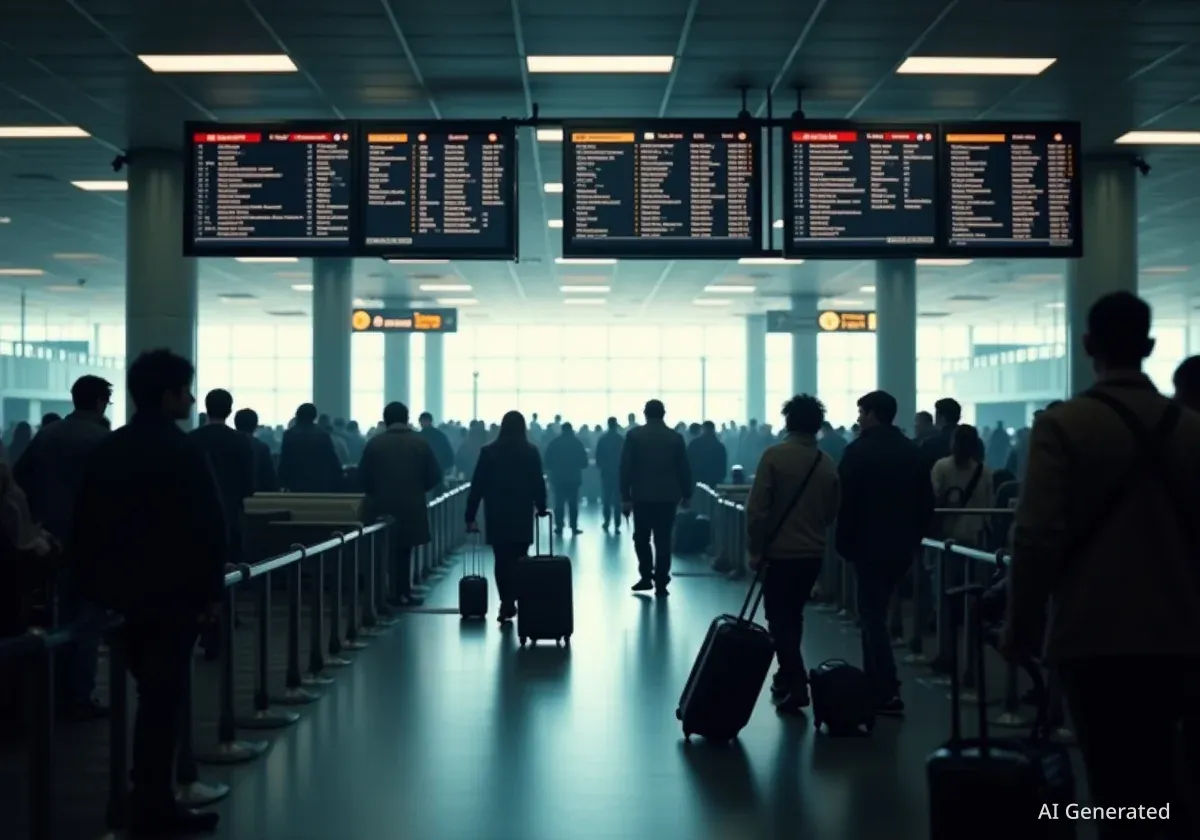Flights departing from Chicago O'Hare International Airport experienced significant delays Saturday. An equipment outage led to a ground delay, impacting numerous travelers throughout the day. Federal Aviation Administration (FAA) officials confirmed the issue, which has since been resolved.
Key Takeaways
- Chicago O'Hare International Airport faced Saturday flight delays.
- An equipment outage caused a ground delay.
- Departures were delayed by an average of 38 minutes.
- The FAA lifted the delay after resolving the issue.
Ground Delay Impacts O'Hare Operations
Saturday saw disruptions at one of the nation's busiest airports, Chicago O'Hare International. An equipment outage prompted the FAA to issue a ground delay. This measure temporarily halted or slowed down departing flights, affecting travel plans for thousands.
The FAA reported that the average delay for departures reached 38 minutes. This type of delay is implemented to manage air traffic flow when airport capacity is reduced, often due to weather or, in this case, equipment problems.
Fact: O'Hare's Scale
Chicago O'Hare International Airport is a major global hub, consistently ranking among the busiest airports worldwide in terms of aircraft movements and passenger traffic.
Details on the Outage
Officials did not immediately specify the exact nature of the equipment failure. The FAA's statement confirmed an outage but did not detail which specific systems were affected or the cause of the problem. Such information is often subject to further investigation.
Air traffic control systems rely on complex equipment. A malfunction in any critical component can lead to operational challenges and require immediate responses to ensure safety. The quick resolution by the FAA was crucial in minimizing prolonged disruptions.
FAA Lifts Restrictions
The good news for travelers is that the FAA has since lifted the ground delay. This means normal departure operations have resumed at O'Hare. Travelers who were impacted by the delays can expect their flights to proceed, though some residual delays might persist as the airport clears its backlog.
Airport authorities and airlines worked to manage the situation. They aimed to get passengers to their destinations as safely and quickly as possible once the technical issue was resolved. Communication with passengers during such events is vital to keep them informed.
"Our priority is always the safety and efficiency of air travel. We worked quickly to address the equipment issue and restore normal operations," an unnamed FAA representative stated, emphasizing the swift action taken.
Broader Impact on Air Travel
While the delay was contained to O'Hare and has been resolved, even short disruptions at major hubs can have a ripple effect. Flights originating from O'Hare often connect to other airports, potentially causing minor delays down the line for connecting passengers.
Travelers are always advised to check their flight status directly with their airline, especially during periods of operational uncertainty. Real-time updates provide the most accurate information on departures and arrivals.
Background: Airport Operations
Airports like O'Hare operate 24/7, managing thousands of flights daily. A vast network of technology and personnel supports these operations, from air traffic control to ground services. Equipment failures, though rare for critical systems, can occur and require immediate intervention.
Weather Conditions Remain Favorable
The equipment outage occurred despite favorable weather conditions in Chicago. Forecasts for the region indicate plenty of sunshine and seasonable temperatures. This helped prevent a more complex situation, as weather-related delays often compound technical issues.
The city has seen a mix of weather recently, including colder mornings. Friday was the coldest in over six months, and Thursday recorded the chilliest low temperature in 167 days. However, Saturday's forecast offered clear skies, which was a positive factor during the operational challenge.
- Weather Outlook: Plenty of sunshine
- Temperature: Seasonable
- No Storms: Tropical Storm Melissa brought heavy rain to other areas days ago, but Chicago remained clear.
Ongoing Monitoring and Future Resilience
Following such incidents, aviation authorities typically conduct a review. This helps to understand the root cause of the equipment outage and implement measures to prevent future occurrences. Maintaining robust and redundant systems is a continuous effort in the aviation industry.
The quick resolution demonstrates the responsiveness of air traffic management teams. The focus now shifts to ensuring continued smooth operations and maintaining the high standards of safety and efficiency expected at international airports like O'Hare.
TravModo will provide further updates if additional information regarding the equipment outage or its long-term implications becomes available.





